How many calories should a woman eat for fat loss?
Posted by Michael Vacanti
We are completely mishandling weight loss for MOST WOMEN at the calorie level.
Lean and sexy on 1200 calories per day!
Picture this.
You are waiting in line at supermarket checkout.
Your attentions shifts from the magazine rack to your iPhone.
You read on facebook:
“GIRLS!! STOP STARVING YOURSELF ON 1200 CALORIES DIETS! YOUR BODY NEEDS FUEL TO PERFORM”
Written by a strong, smart, respected woman.
You nod in enthusiasm. 1200 calorie diets DO suck. You’ve tried them. You were hungry and irritable and lethargic.
“Stop starving yourselves,” she continues. “These magazines are bullsh*t!!”
Now, this battle is admirable.
This woman is good hearted and her words are well-intended.
But she is wrong.
If your maintenance is 1800 or 1900 calories, you are not “starving” on a 1200 calorie diet.
Let’s back up though.
No, here is a list of women we ARE NOT talking about:
- You are relatively advanced in training
- Maintenance, recomposition or muscle gain is your priority
- You were previously or are currently a serious athlete
- You are genetically predisposed to elite levels of lean body mass
So, before you read the headline and go straight for the comments to tell me I’m a bully and you dieted down to 12% for your sixth figure show on 300g of carbs per day, chill out. I’m not talking about you.
Who we ARE talking about:
- You are relatively sedentary
- You want to lose bodyfat / look and feel better
- You are busy and don’t have countless hours to be a gym rat
- You haven’t done much strength training with barbells
I know you. I know you insanely well because I coach you. I’ve coached thousands like you. And if I don’t coach you, I am exchanging emails with you every single day.
You are not a superstar athlete. You do not work a physically strenuous job. And you want to lean out a bit. Meaning, you want to get toned, defined, smaller, lose fat, etc.
You are the majority.
Our Biggest Problem: A GROSS misunderstanding of calorie maintenance
Listen up, we’ll make this as simple as possible.
Eating a 1200 calorie diet cannot be labeled good or bad without context. And the most relevant factor in setting appropriate calorie intake is the individual’s calorie maintenance.
What is calorie maintenance: Number of calories you eat in a day to maintain your current weight.
This is comprised of 1. Basal Metabolic Rate 2. Calories burned via activity/exercise 3. Digestion (thermic effect of food) and 4. Calories burned via non-exercise activity.
In an attempt to simplify things, many sites including my beginner’s fitness guide use total bodyweight to estimate calorie maintenance.
- Bodyweight x 14-15 = maintenance
Unfortunately, this is an oversimplification.
Lean body mass is more accurate than total bodyweight for determining calorie maintenance.
Lean Body Mass: Total Bodyweight minus Bodyfat.
- For Example: A 5’3” 150 pound woman with 34% bodyfat has a vastly different calorie maintenance than a 5’9” 150 pound woman who is 22% bodyfat even though they have the same total bodyweight.
That’s because our first woman has 99 pounds of lean body mass and our second woman has 117 pounds of lean body mass.
While they share the same total bodyweight, the leaner woman will have a higher calorie maintenance.
This is primarily because muscle requires more energy to maintain than bodyfat.
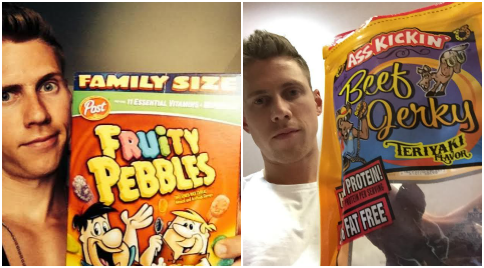
A completely unrelated pair of food selfie pics to offset the utter bore of this section. I promise this blog post gets better.
How to accurately estimate calorie maintenance
Alright, so bodyweight x 15 is no good… what should I do?
There are many ways to estimate calorie maintenance. I like the Katch McCardle equation best.
Katch: BMR = 370 + (9.82 x LBM)
.
This equation allows us to estimate our basal metabolic rate (BMR).
We can multiply our BMR by 1.25-1.7* to estimate our calorie maintenance.
To run with our previous example: 150 pounds and 34% bodyfat:
- (1-.34) x 150 = 99 pounds LBM
- 370 + (9.82 x 99) = 1342 BMR
- 1342 x 1.3 = 1745 calories
What do you think happens when our friend here eats 2000 calories per day (and strength trains) because that’s what her favorite instagram star does?
She is going to build muscle and slowly increase scale weight.
And let me be clear, this is not a bad thing. I think building muscle and getting more strong/athletic/conditioned is cool.
But it isn’t her goal.
Set a calorie intake based on your estimated maintenance to ensure you are moving in the right direction.
*If you are MORE active, use a higher multiplier. For example, a woman with a 9-5 office job and very few physically active hobbies would be closer to 1.25. A single mom bartender who hustles her face off with two kids is closer to 1.7 or higher. Make sense?
Next Problem: Most of us drastically underestimate our Bodyfat Percentage
Look, body image is messy. It is hard to be completely honest with ourselves. Admitting that you might be 38% or 42% or even 55% bodyfat isn’t easy.
But if you are underestimating bodyfat, you are drastically overestimating calorie maintenance.
Put simply, this means you can nail your macros every single day and not lose ANY bodyfat because your numbers were flawed from the start.
She emailed me out of the blue.
Carrie, we’ll call her. 5’2″ and 194 pounds at 39 years old.
I get it… 30% seems like a big number.
And you’ve never had a reason to estimate bodyfat before. So, you are in a sense blindly guessing… because how important can the accuracy of that number really be, right?
After a few emails back and forth, we shared photos. We talked about how bodyfat calipers work. I told Carrie that for a woman of her height who has never strength trained seriously before, it is very unlikely she has that much lean body mass.
We conclude that Carrie is 49% bodyfat.
She is mortified. She is so sick with herself. She can’t believe it.
But guess what, this created a change of 482 calories in her deficit! That is literally the difference between losing 50 pounds in a year and not losing a single pound.
How important can estimating bodyfat really be? It’s the difference between making a dramatic transformation and staying exactly the same.
Currently down 13 pounds in 8 weeks, Carrie is owning the game.
I will be writing a “How To Measure Bodyfat” piece, but in the meantime if you want information check out this series by John Romaniello.
Small deficits, slow progress and that damn bathroom scale
So, I did all the calculations and my maintenance is 1900 calories. If I eat 1600 per day, I will still lose weight, right?
Absolutely.
However, we have a problem. It is not a physiological problem, but rather both a psychological and lifestyle problem.
At an estimated 300 calorie deficit, you will lose ~0.5 pounds per week.
However, there are a few things you need to be aware of.
First, small deficits are risky because they assume super accurate calculation of calorie maintenance, which isn’t always possible (see FAQs at the bottom of this post).
Further, if you are 10% off on hitting your macros because you weighed your chicken cooked instead of raw or you forgot about that small handful of pistachios after lunch you essentially wipe out your deficit completely.
For those of use who aren’t competitive bodybuilders, super small deficits are unrealistic to manage.
But let’s assume we count perfectly AND estimate our maintenance with great accuracy.
Here’s the scariest part:
You can do everything right. Drop 0.5 pounds of bodyfat per week. And weigh the exact same on the scale 7 weeks into your program.
Crazy right?
You will have lost 3.5 pounds of bodyfat over 7 weeks. But the scale will tell you otherwise. Things like water, carbs, alcohol, salt, big dumps, time of day and time of month cause the bathroom scale to move up and down like crazy.
Can you handle these swings?
Will you stay disciplined on your fat loss plan knowing that you weigh the exact same on February 19th as you did on January 1st despite the fact that you are doing everything perfectly?
Personally, I can’t.
And in my experience coaching thousands of clients, tiny deficits simply do not work. People need to see results to create a positive feedback loop. And when the goal is fat loss, bodyweight is a relevant measure of progress.
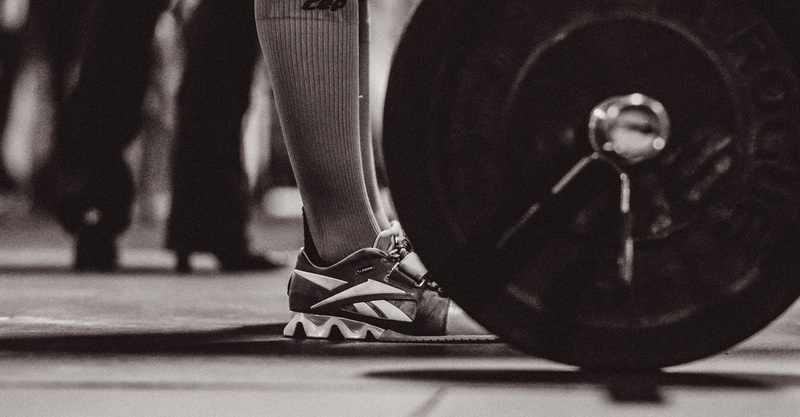 A strange social shift: SHAMING women for wanting to lose weight
A strange social shift: SHAMING women for wanting to lose weight
We aren’t talking about the shaming that comes from your disgruntled co-workers or your jealous siblings or even your sabotaging friends when you go on a diet.
Those all exist, but that’s separate.
We are talking about the growing popularity of belittling fat loss related goals.
And let me be clear: I think this is partly awesome. I think if you’re a chick who wants to get strong, hell yes. I think if you want to get sick at olympic lifting or be able to do 5 strict pull ups, that is bad ass.
But if you would rather lose 50 pounds of bodyfat than squat 225×10, that’s okay too
Now, these aren’t mutually exclusive; fat loss and strength gains can co-exist for many people.
But having fat loss as your first priority will yield vastly different training and nutrition than if that goal is strength or performance.
So when you tell a woman with an estimated maintenance of 1800 calories to eat 2100 calories per day (to keep her metabolism up!!) and follow your high volume olympic lifting program 5x/week, she will get stronger and increase work capacity and gain muscle mass and have an awesome barbell snatch.
But remember… that’s not her goal. She wants to lose weight.
So we need to program training and nutrition around her goals.
The Instagram Goddess: promising a false reality
You want to look like her and she posts everyday telling you how to look like her.
Why can she eat 2600 calories per day and look like that… but I can’t?
I’ll tell you why:
There is a tremendous difference in the nutritional needs of a lean woman maintaining her figure and an overweight woman trying to lose bodyfat.
It’s really that simple.
She isn’t currently trying to lean out. You are. Period.
And a special note to you, IG girl: I get that you need to sell fucking quest bars with your affiliate link. Or however the hell you are monetizing your genetically superior ass.
But to promise women they can have your body while eating massive amounts of carbs and calories is fraud.
It is immoral. And is disgusting. And if I ever see you in real life I will Avada Kedavra all over your face.
Support groups led by well-meaning airheads

This is Heather. She is one of my online coaching clients. And she is an awesome person.
When Heather and I started working together, she posted her stats and macros in a fitness support group for women on Facebook. One of the ring leaders had an opinion:
OMG your macros are WAY bad your coach is like TERRIBLE!!
The concept of a free online fitness support group is really very cool. Women share information about their programs. They encourage each other. And they look out for any horribly restrictive or dangerous diets.
So the thing is, I totally empathize with this girl. She didn’t want Heather turning into a starved cardio bunny. She was trying to do good.
And based on her personal experience, it is understandable that she believes what she does. With above average genetics, years of training experience, ample lean body mass and fat loss a non priority she is in a position where she can carb cycle around maintenance and slowly recomp her already lean and muscular body.
The ring leader has never coached a client. She doesn’t possess 14 years of voracious study and obsession about training and nutrition. But she did watch 12 minutes of a vlog on metabolic damage one time. So I guess there’s that.
When Heather joins the group only averaging 62 grams of carbs/day or whatever, miss ring leader wants that coach’s nuts (mine).
And not in a hot yeah let’s do this I have a new apartment in Hell’s Kitchen, kind of way. But more of a Ramsay Bolton goes crazy on Theon Greyjoy kind of way*
Her heart and enthusiasm are coming from a good place.
She just lacks the experience and perspective to dole out nutrition advice to women on the internet who she barely knows.
The take home point here is this: be careful who you take advice from. Which I’m pretty sure was listed on my 40 rules to live by post.
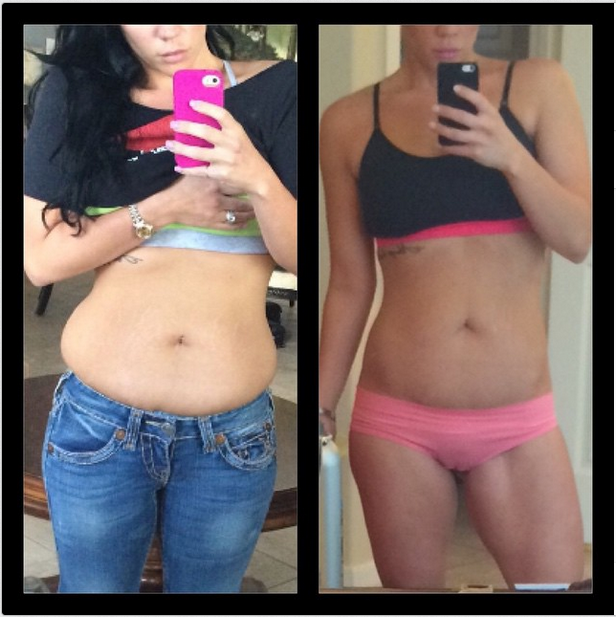
Oh, Heather is currently down 15 pounds of fat. Up 4.5 pounds of muscle. And eating 250g of carbs on training day, which is continuing to increase week over week.
But guess what: she sure wasn’t eating like that during phase one when fat loss was her primary goal.
*ps I’m obviously not Theon, I am Ned Stark. But I just had to work some pop culture into this post because I know you currently hate me for all the math.
Lastly: an irresponsible ignorance of science and energy needs
Last but not least, there are still niches of people who don’t accept energy balance. They find calories largely irrelevant, and will argue that food quality is more relevant than quantity for weight gain and weight loss.
Obviously, kcals aren’t the end all be all. They are far from a perfect metric. But they are what we have right now, and they are certainly the most relevant factor in manipulating bodyweight.
So, when my 5’4″ 167 pound new client with 94 pounds of lean body mass tells me:
I don’t need to count calories. I eat healthy foods!
- Breakfast – bulletproof coffee and a large glass of orange juice
- Snack – two pieces of toast with natural almond butter
- Lunch – Roast beef sandwich (on whole wheat bread with high quality cheese, mayo, mustard and spinach), raw zero trans fat potato chips, and homemade sour cream.
- Snack – fruit shake with agave and cranberry juice base
- Dinner – black bean veggie burger with okra sautéed in olive oil and organic quinoa
- Snack – a couple of organic cookies and a handful of dark chocolate chunks
I empathize. I know she is trying to eat healthy and I respect her heart and her effort.
But you can’t lose weight if you aren’t in a deficit.
Is the Sharpay Evans 1200 calorie diet right for you?
I don’t know.
But a specific calorie intake cannot be glorified or demonized without context.
Are you a woman without much lean mass who wants to lose bodyfat? Or are you an ex-D1 pole vaulter training to win the crossfit games?
If you are closer to the former, follow the advice in this article. Honestly estimate your lean body mass. Use Katch to estimate your calorie maintenance. Set a deficit that isn’t too small. Count your macros. Train. Sleep. Drink water. Track progress. Ignore people who suck.
And then reverse diet your way back to glory because even if a 1200 calorie diet makes sense for you, no one wants to do that for very long.
Access to my personal email account
If you aren’t currently on my email list, that’s silly. Sign up here.
I’ll send you a free copy of The Beginner’s Fitness Guide and you will have access to my personal email account.
FAQ
Q: Mike – I have had an eating disorder / real emotional issues with food and I really really really don’t want to count calories. What should I do?
A: I get it. It probably doesn’t make sense to count calories and that’s okay. Focus on making good qualitative decisions around food. Make 80-90% of what you eat lean protein, produce, whole grains and all the other stuff that we intuitively know is healthy. Listen to your body. Eat slower. Stop shy of fullness. Strength train and add cardio if you enjoy it. Do things you like. Hang out with people you love. Meticulously tracking cals/macros might not make sense for you.
Q: Wouldn’t this apply to men with low levels of LBM too?
A: In a sense, it does. But here is the difference: when women overfeed without strength training, almost all weight gained is bodyfat. When men overfeed without strength training, they gain about one pound of muscle per two pounds of bodyfat. So, untrained/beginner overweight men are going to have more lean body mass than untrained/beginner overweight women (beyond the built in genetic differences that already exist).
Q: I didn’t read the article, but I want to leave a scathing comment because that’s just the type of person I am. What should I do?
A: Do what you gotta do, bro.
Q: Can’t I just workout 21 hours per week to offset the calories?
A: You can absolutely do that! However, my training philosophies are based on getting the most out of your time. I don’t really cater to folks who want to be professional bodybuilders or powerlifters. I know you are super busy and there are other important aspects of life – so I want to get you results in the best way possible which usually means only a few hours of training per week.
Q: Why do you use BMR x Multiplier to get maintenance rather than calculate each of the 4 components of metabolism individually?
A: While we CAN calculate BMR, TEF, Exercise Expenditure and NEAT separately, I don’t like to because: 1) it makes the process unnecessarily complicated, 2) most of us don’t have a sound way to measure calories burned via exercise (and people LOVE to overestimate here) and 3) NEAT varies tremendously from person to person.
Q: How can you be so sure about estimating maintenance? Aren’t there genetic variations between people with equal stats? Doesn’t calorie expenditure vary from person to person for the same amount of work?
A: You are right and this is a super valid point. We are talking about an estimate of calorie maintenance. We will never know your true maintenance with 100% certainty (it’s always changing, by the way) and we don’t need to.
All we need to do is get close. Then, by tracking intake and measuring progress we can backdoor our way into your actual maintenance and adjust your macros as needed 🙂


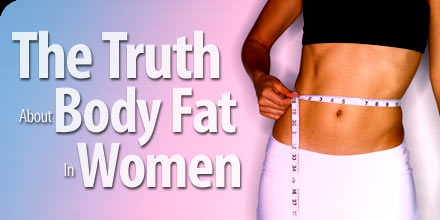
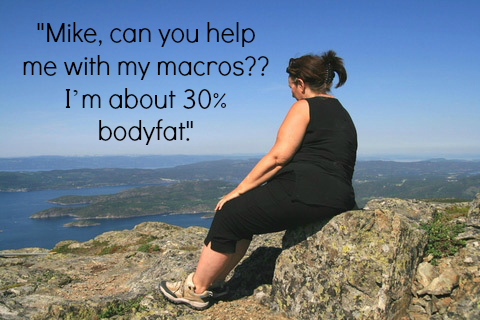
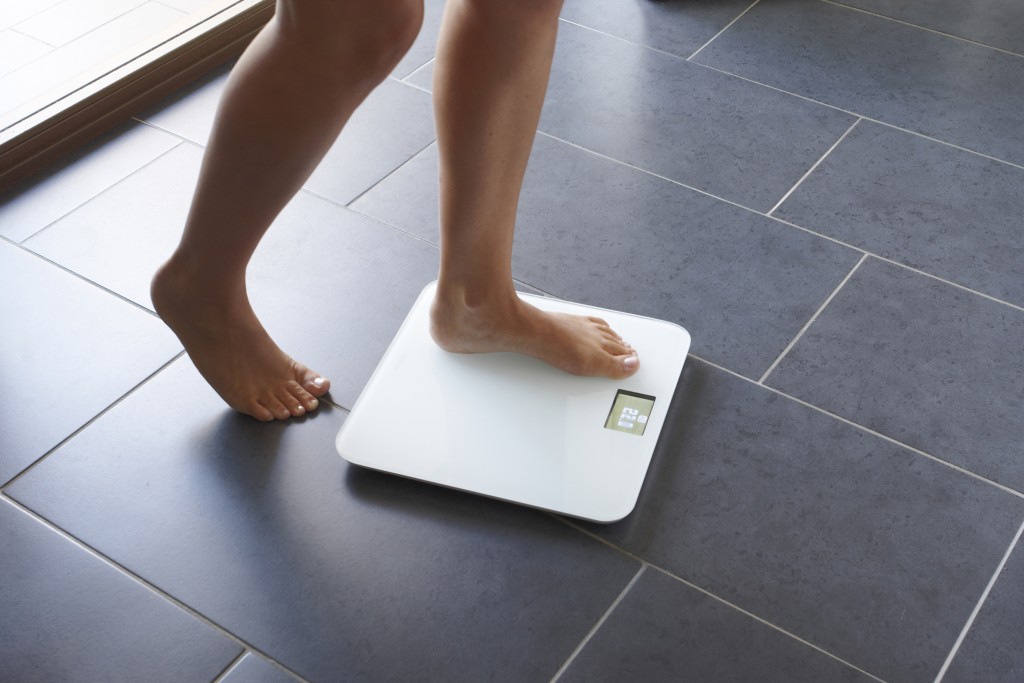


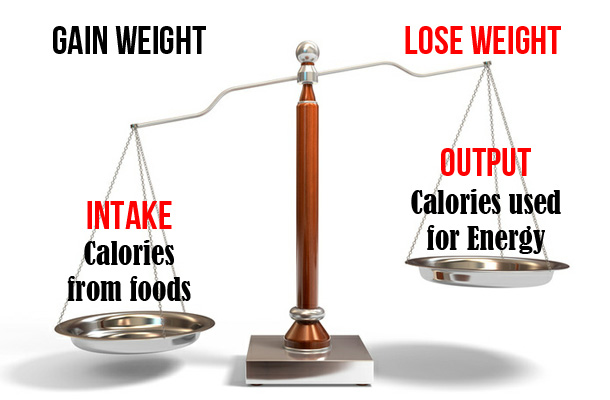
Brian
Sharing this with all my female clients now. Love this, Mike!March 10, 2015 at 3:32 pm |